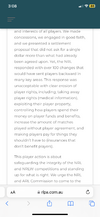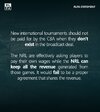On Wednesday, NRL and NRLW players took the brave step and committed to action in an attempt to drive a fair and reasonable outcome for their joint-collective bargaining agreement after the NRL walked away from negotiations. It was a player-led decision that has created much discussion and...

www.rlpa.com.au
FAQs of CBA Dispute
On Wednesday, NRL and NRLW players took the brave step and committed to action in an attempt to drive a fair and reasonable outcome for their joint-collective bargaining agreement after the NRL walked away from negotiations.
It was a player-led decision that has created much discussion and questions about how we got here, what the issues are, and how the dispute can be resolved.
To give the public and industry more certainty, we have provided answers to some FAQs below. We believe the answers to these questions should also be – why are the NRL doing this to players?
Governing a game isn’t about control. Stakeholders (including players, clubs and states) are allowed to hold the governing body to account to ensure they’re being transparent and leading the game effectively. The role of the governing body is to support stakeholders to make sure we can all be partners in growing and promoting the game.
The players’ right to hold the governing body to account shouldn’t be reduced and their power shouldn’t be increased by trying to buy off rights that aren’t for sale.
The key to resolving this is the RLPA and NRL re-commencing negotiations with an agreed independent industrial relations mediator (which we have not had to date). Remember, all these terms below the NRL presented were not negotiable and left players with little choice.
Is this all about money?
No. We have not asked for a single dollar more from the NRL since December 2022.
Why did the players take action?
After 20 months of negotiating, the NRL responded to the players’ settlement proposal with 100 drastic changes and said it was a take-it-or-leave-it offer, effectively halting negotiations.
The players were left with little choice but to take action and get the NRL back to the negotiating table.
What is the intent of the action?
The RLPA and NRL must agree to re-commence negotiations with an industrial relations mediator to reach an outcome on their 100-plus changes to our settlement proposal.
We have nothing to hide, and neither should the NRL. Let’s allow an expert to reach an outcome on all resolved matters.
The players’ current action will only end once there is a draft CBA ready to be taken to NRL and NRLW players for ratification. NRL player benefits must also return to pre-COVID levels for 2023.
Are the RLPA against expansion?
No.
What is the issue with the season schedule then?
The NRL want to have full control rather than equal agreement rights with players and clubs to add two more rounds to the NRL schedule. That would be at least another 16 matches that they don’t have to agree with the RLPA.
This would place a health and safety risk on players and is a clear player workload issue. At a time when the game has never been more intense, the NRL and ARL Commission should not be looking to increase the match obligations of players without agreement with players.
Agreement (which is different to consultation) with players is not stopping the game from moving forward. It’s respecting the players as partners who put their bodies on the line for the product, and working together.
What is the issue with the player data?
The NRL’s position on the collection and storage of player data (both medical and otherwise) doesn’t comply with privacy laws. They are attempting to assert ownership over player data and use or sell it without the informed consent of the player.
By failing to responsibly protect personal data and interests, this becomes just another demonstration of significant overreach and is an attempted abuse of power.
What is the issue with financial reporting?
The RLPA had to fight during COVID and last year’s revenue share negotiations to increase what was owed to players by $28m. It is important to have the proper rights and access to accurate financial information from the NRL, particularly when we are in a revenue share agreement with the governing body.
However, the NRL has tried to minimise its financial reporting requirements and the ability for the RLPA to challenge and audit NRL accounts in order to verify numbers and ensure compliance with the CBA and our revenue share arrangements.
If the game loses more than $10m in a single year, despite exceeding forecasts every other year, the NRL want players to share in that loss. That means the NRL could meet and beat their revenue forecasts over the 2023-27 term, but the players would still have to take cuts to their pay and/or benefits. Without the proper financial reporting, how can players be sure they are sharing in the losses fairly?
The NRL has also proposed to have absolute discretion to terminate the CBA if they lose a total of $40m during the term, even if that was foreseen or it was due to their own poor financial estimates or deal-making.
The NRL terminating the CBA at their discretion would leave the players incredibly vulnerable, removing rights that have been secured and certainty around your payments and the funds set up to support players in transition and retirement. This does not represent fair nor equal rights on a decision of such significance.
What is the issue with international payments?
The NRL have included international payments for NRL-run international series to be paid for by the players.
That is a cost that has not previously been included in the CBA, primarily because it relates to employment for a players’ nation, not in the NRL. Now the NRL want those costs absorbed by the NRL players, for the same share of revenue (plus absorbing training wage, private health insurance and education costs that weren’t previously included).
All NRL Players would be paying for international payments, effectively by reducing other benefits owed to them. The NRL wants to then take any revenue generated from those games without sharing it with the players.
This might be acceptable if the NRL included money from these matches in their financial forecasts, and in the players’ share of revenue. But they haven’t, and they’re not being transparent. The NRL have not shown players or the proposed competing nations clear financial detail relating to sponsorship, government funding or grants, forecasts for ticket sales or broadcast revenues.
They want to use money generated by the NRL and NRLW competitions to pay for all international matches they run and own.
The RLPA position (which we proposed to the NRL) is that there should be equal payments for all players from all Nations playing in these tournaments (including Kangaroos and Jillaroos). However, those payments should be determined and paid for by the money (sponsorships, broadcast, tickets, government funding) generated from those international games.
What is the issue with NRL minimum salaries?
For 2023, the NRL want to reduce the Top 30 minimum salary from $130,000 to $120,000, the Supplementary List minimum salary from $85,000 to $70,000, and weekly training wages from $1,200 to $1,000.
What is the issue with integrity?
The NRL have tried to place significant limitations on the RLPA’s access to integrity-related notices, limiting our ability to fully support players and ensure the process is a fair one.
What is the issue with insurance?
The NRL has tried to include Representative Injury Insurance being paid for from the players’ money, despite that insurance being of zero benefit to players. This insurance is not a benefit for players, it is a club benefit, so the players shouldn’t have to pay for it.
Players have contract security already, so this would be paying insurance for the salaries players are already entitled to.
What is the issue with consultation?
The NRL have tried to reduce their obligations on what they have to discuss when consulting with the RLPA and reduced our ability to challenge their decisions that impact players and keep them accountable.
This is a blatant attempt to keep us information-poor and cut out the players’ voices on important matters that impact them.
/1
www.rlpa.com.au




